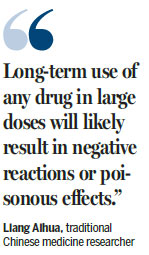Plant acids found in TCM to get scrutiny
Review sought after study finds risks of cancer, organ damage

The China Food and Drug Administration will conduct risk assessments of drugs that contain potentially dangerous plant acids and may limit or ban their use.
The CFDA made the announcement on Monday following a study published in the journal Science Translational Medicine on Oct 18 that suggested the substances may be linked to liver cancer in Asia.
The report said stronger measures are needed to prevent people from consuming the substances - called aristolochic acids - which are found in many types of plants. The plants have been used in traditional Chinese medicine to treat a variety of symptoms and diseases, such as arthritis and inflammation.
The study stirred widespread concern among members of the public in China, which reports about half the world's new cases of liver cancer every year, according to the World Health Organization.
All pharmaceutical companies that use materials containing aristolochic acids will be required to conduct safety tests; otherwise the CFDA will cancel permits for production of drugs containing the acids and order them to halt production, the statement said. The statement did not give the deadline.
After the CFDA has reviewed the companies' evaluations and their proposed safety measures, the companies will be expected to cease production of drugs containing aristolochic acids when the risks are found to outweigh the benefits, it said.
For products that bring more benefits than risks, on the other hand, the producers should revise and improve specifications for their safe use, it said.
The study said that aristolochic acids have been linked to cancers in the urinary tract and may lead to kidney failure - a finding confirmed by the CFDA, which said kidney damage and possibly even kidney cancer can result from their use.






















